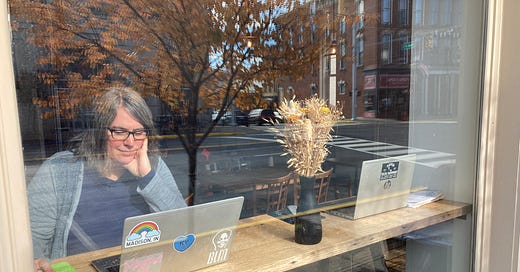Did I turn on paid subscriptions? Yes. Is it too late to become a paid subscriber? No, of course not. Just click the button below. Did you miss anything? Yes, this post about how I found and lost my agent.
I love our local coffee shop any time of the year, but especially during the week of Thanksgiving. During that week, the usual crowd changes. It gets younger. A little funkier. More stylish. Sitting in our coffee shop the week of Thanksgiving, you might think you’re in a whole different town, but it’s only that the kids have come home for the holiday.
It sounds strange to say, but I like living in a place that young people leave. I am, after all, a leaver myself. I’m not a native Madisonian. I grew up in a small town an hour up-river. Part of the delight I take in sitting in the coffee shop on Thanksgiving week comes from my status as an outsider-within. I understand what it’s like to be from a small town, to have left it, and to come home. But it’s not my home town and that makes all the difference in the world.

When I was growing up in my small town, people didn’t much leave. The idea that you might go to college out-of-state was a little weird at my high school. As far as I could tell, only one person in recent memory had gone to college out-of-state and she’d only made it a year before coming home. There was a definite sense that going to college all the way in Mississippi was a little risky. Maybe a little presumptuous?
Of my three closest friends in high school, all three of them went to college locally, as in, withing a 15-minute drive. I was the aberration and it was a little lonely. Going away changes you, after all. So I like being in a place where kids do go away, sometimes quite far. And I like watching them come home.
Of those three closest friends, I ended up as an adult living the farthest away from my home town—an entire hour and change. I also live the farthest away of my siblings. In the town where I’m from, people stay and I didn’t.
There’s a big narrative in American society that calls that progress. We are, after all, a nation of leavers. Most of us left the places we were from to come steal a country from the people who were already here. Then later, we left to go West and gobble up more of the land. When we were done heading West, we started leaving the farms and small town where we grew up for the city.
As a leaver myself, I bought into that narrative hook, line and sinker. Nothing good or exciting would happen to me unless I could get the hell out of the small town where I grew up. The part they don’t tell you is how hard it is afterward to go home. Or the pieces of yourself that you might lose along the way.
It wasn’t until I read an essay by Wendell Berry (I think in What People Are For) that it occurred to me that this big narrative might be a lie. Or at least, not the whole truth. Maybe you don’t have to leave. Or maybe the leaving isn’t the greatest thing. All your brightest and best young people leaving? That’s called brain drain and I knew all about that. It just never occurred to me that it could happen to small towns as much as it happens to countries in the developing world.
It still makes me happy to sit in the coffee shop during Thanksgiving week. There is something beautiful about homecoming. My daughter is a leaver now, I guess, off away at college, and I want that for her. I want her to experience a world that is bigger than Madison. But sometimes, I want her to come home, too. Or more than that, I want her to have a sense that there is a home to come back to.
Thanks for reading and to all the new subscribers! So happy you’re here!




your personal story explains what keeps many rural/small town Americans from not only leaving but climbing the social ladder. Social network anchoring. This is why immigrants do so much better at social mobility I think. They don’t have any local network anchors and have enormous ‘freedom’ native born Americans do not.
Interesting but adds to my holiday melancholy. Grown children who will never come home for more than a short visit.